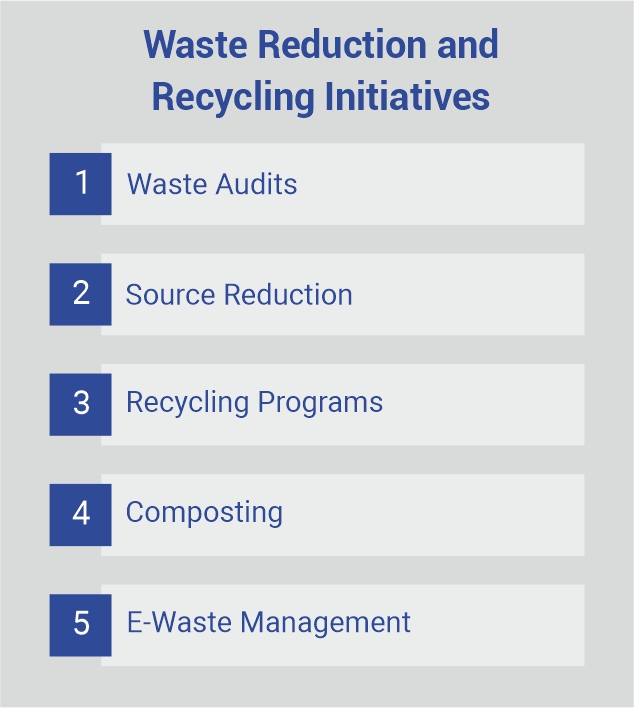Sustainability in Integrated Facility Management (IFM) is crucial for India's burgeoning industrial and commercial sectors. Sustainability in IFM not only aligns with environmental goals but also offers economic and social benefits. As the country faces significant environmental challenges, including air pollution, water scarcity, and waste management issues, implementing sustainable practices in IFM can play a pivotal role in mitigating these impacts. Sustainable IFM strategies, such as energy-efficient building operations, waste reduction initiatives, and water conservation measures, not only reduce environmental footprints but also lead to substantial cost savings and improved operational efficiency. Moreover, these practices align with India's national sustainability goals and regulatory frameworks, fostering compliance and enhancing corporate reputation. By prioritizing sustainability in IFM, Indian businesses can contribute to environmental preservation while driving economic growth and social responsibility. This blog explores sustainable practices within IFM, focusing on green building certifications, energy management strategies, and waste reduction and recycling initiatives.
Green Building Certifications
Green building certifications are a key component of sustainable facility management. These certifications provide a framework for designing, constructing, and operating buildings that minimize environmental impact and promote occupant well-being. The most recognized green building certification programs include LEED (Leadership in Energy and Environmental Design). It is the most widely used green building rating system worldwide. It provides a point-based framework for achieving sustainability in several areas, including energy efficiency, water conservation, waste reduction, and indoor environmental quality. Buildings earn points across different categories, and based on the total points achieved, they can be certified at different levels (Certified, Silver, Gold, and Platinum).
Energy Management Strategies
Energy management is crucial in facility management services in India due to its significant impact on operational costs, environmental sustainability, and overall efficiency. Effective energy management helps facilities reduce energy consumption, leading to substantial cost savings, and also improved profitability. Additionally, it supports environmental goals by lowering greenhouse gas emissions and reducing the facility's carbon footprint. By implementing energy-efficient practices and technologies, facilities can enhance their operational performance, ensure regulatory compliance, and contribute to broader sustainability initiatives.
Several strategies can be implemented to enhance energy efficiency in facilities:
1. Energy Audits:
Conducting regular energy audits helps identify areas where energy is being wasted. These audits involve a thorough analysis of energy use within the facility, pinpointing inefficiencies, and recommending improvements.
2. Building Automation Systems (BAS):
BAS integrate and automate various building systems, such as heating, ventilation, air conditioning (HVAC), lighting, and security. By using sensors and advanced algorithms, BAS can optimize energy use, adjusting systems in real-time based on occupancy and other factors.
3. Renewable Energy Sources:
Incorporating renewable energy sources, such as solar panels or wind turbines, can significantly reduce a facility's reliance on fossil fuels. On-site renewable energy generation not only provides a sustainable power source but also can lead to long-term cost savings.
4. Energy-Efficient Lighting:
Replacing traditional lighting with energy-efficient alternatives, such as LED bulbs, can drastically reduce energy consumption. Implementing smart lighting systems that adjust based on occupancy and natural light availability further enhances energy savings.
Waste Reduction and Recycling Initiatives
Managing waste effectively is a critical aspect of sustainable facility management. Implementing waste reduction and recycling initiatives can minimize environmental impact and promote a circular economy.

1. Waste Audits:
Similar to energy audits, waste audits analyze the types and amounts of waste generated within a facility. By understanding waste streams, facility management service providers can develop targeted strategies to reduce waste at the source.
2. Source Reduction:
Source reduction involves modifying processes and practices to reduce the amount of waste generated. This can include purchasing products with less packaging, using durable and reusable materials, and optimizing inventory management to avoid overstocking.
3. Recycling Programs:
Implementing comprehensive recycling programs ensures that recyclable materials are diverted from landfills. Facilities should provide clearly marked recycling bins and educate occupants on what can be recycled. Partnering with recycling companies can also ensure proper handling and processing of recyclable materials.
4. Composting:
For facilities that generate organic waste, such as food scraps, composting can be an effective waste reduction strategy. Composting organic waste not only diverts it from landfills but also produces valuable compost that can be used for landscaping and gardening.
5. E-Waste Management:
Properly managing electronic waste (e-waste) is crucial due to the hazardous materials it contains. Facilities should establish e-waste collection points and partner with certified e-waste recyclers to ensure safe and environmentally friendly disposal.
The Benefits of Sustainable Practices in IFM
Implementing sustainable practices in IFM offers numerous benefits beyond environmental protection. These include:
1. Cost Savings:
Energy efficiency measures and waste reduction initiatives often lead to significant cost savings in operational expenses. Lower utility bills, reduced waste disposal costs, and potential tax incentives for sustainable practices can improve a facility's bottom line.
2. Enhanced Reputation:
Sustainable practices can enhance a facility's reputation among clients, tenants, and the community. Being recognized as an environmentally responsible organization can attract eco-conscious clients and improve stakeholder relationships.
3. Regulatory Compliance:
Adhering to sustainability standards helps facilities comply with environmental regulations and avoid potential fines or legal issues. Staying ahead of regulatory changes ensures long-term operational stability.
4. Improved Occupant Well-Being:
Sustainable buildings often provide healthier indoor environments, leading to improved occupant well-being. Better air quality, natural lighting, and ergonomic design contribute to increased productivity and satisfaction among building occupants.
5. Environmental Impact:
Ultimately, sustainable practices in IFM reduce the overall environmental footprint of a facility. Lower energy consumption, reduced waste generation, and decreased greenhouse gas emissions contribute to global sustainability goals and help combat climate change.
Conclusion
Sustainable practices in Integrated Facility Management in India are essential for creating efficient, environmentally friendly, and cost-effective facilities. By pursuing green building certifications, implementing energy management strategies, and adopting waste reduction and recycling initiatives, facility managers can significantly enhance the sustainability of their operations. These efforts not only benefit the environment but also provide economic and social advantages, making sustainability a vital component of modern facilities management in India. Embracing these practices today ensures a healthier, more sustainable future for generations to come.
At FFServices, as a leading Integrated Facility Management services provider, we have been diligently assisting our clients with sustainable practices to achieve sustainability goals for our clients. Our commitment ensures a future that is sustainable, responsible, and prosperous for all stakeholders involved. Reach out to us today to take the first step towards sustainability.
Industries we serve:
Automobile | Manufacturing | Pharmaceutical | Oil and Gas | Healthcare | Ancillary | FMCG | Education | Real Estate | Commercial | Mining | Hotels
Also read: The Crucial Role of Facility Management Companies in Reducing Carbon Footprint

